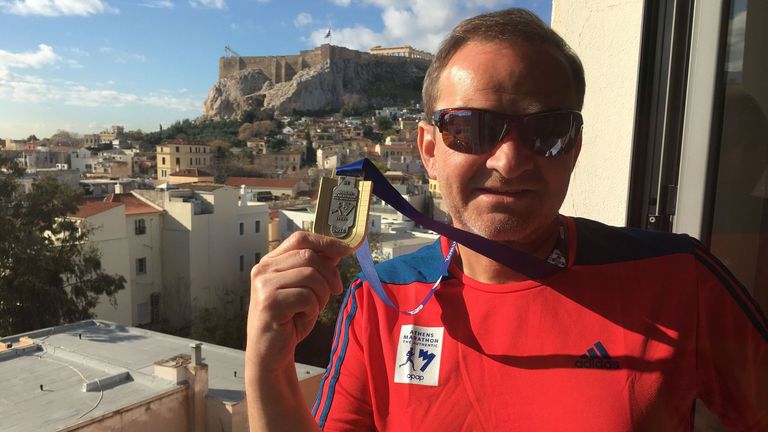A lung cancer patient has become the first in the UK to receive a new experimental vaccine to help his body fight the disease.
Janusz Racz, 67, had six syringes of the jab, each containing genetic material for a different part of the tumour, to train five billion cells in his immune system to go on the attack.
The vaccine, codenamed BNT116, is made by BioNTech using the same mRNA technology that underpinned its highly effective COVID jab.
Doctors say it is far more precisely targeted than chemotherapy so shouldn’t have the same collateral damage on healthy cells that causes sometimes overwhelming side effects.
“It’s painless,” Mr Racz said after his first jab.
“It’s much better than chemo, which was hard for me.”
Sky News was given exclusive access to University College London Hospital (UCLH) as doctors began the UK arm of a worldwide trial of the vaccine.
About 130 patients with non-small cell lung cancer will take part in the study, with six hospitals in the UK involved.
“If I was the hundredth or the first [study volunteer] it does not matter for me,” Mr Racz said.
“I believe it will help me – and help other people if the vaccine goes to production faster.
“COVID vaccines helped millions of people. This will also help millions of people.”
Mr Racz was highly active before he became ill, climbing several mountains and running marathons in seven countries. He is so positive about his future that he has set himself the goal of running the London marathon within the next three years.
How it works
Cancer has an invisibility cloak, hiding from the immune system. But the vaccine flags key components of the tumour as a threat, hopefully triggering the body to respond by obliterating cancer cells wherever they are.
Early trials on similar vaccines in other cancers have proved promising, with a reduction in tumour size and risk of recurrence.
This is the first time the BioNTech jab has been tested in humans. The trial will confirm whether there are any major side effects before doctors proceed to larger studies to establish clinical effectiveness.
Volunteers will receive dozens of doses over 12 months to keep boosting their immune system.
Dr Sarah Benafif, who is running the clinical trial at UCLH, has high hopes.
“We already have some data that this is quite a well-tolerated type of vaccine,” she said.
“We hope in time we are able to show that the treatment is effective against lung cancer whilst leaving other tissues untouched.”
Non-small cell lung cancer is the most common form of the disease. Most, though not all, cases are caused by smoking.
Many patients are diagnosed at an advanced stage when treatment is less effective. Currently, only around a quarter survive for five years.
Unusually the clinical trial will include patients with early disease who have yet to undergo surgery or radiotherapy, as well as those who have cancer that has spread or returned.
It keeps options open on how best to use the vaccine to improve outcomes for people with cancer.
Vaccines ‘could be revolutionary’
Professor Siow Ming Lee, an oncologist at UCLH and clinical lead for the UK part of the study, said new treatments are desperately needed.
“You’ve got 1.8 million deaths worldwide from lung cancer, many in the developing countries,” he said.
“Hopefully we can start with our first generation of mRNA vaccine, and then roll it out to the rest of the world.”
The NHS has begun screening older smokers for lung cancer in the hope of picking up cases earlier. Anyone with symptoms, including a cough that won’t go away, chest pain and fatigue should see a doctor.
NHS England national cancer director Dame Cally Palmer said: “The NHS has a leading role globally in trialling cancer vaccines and if we are successful, they could be revolutionary in vaccinating people against their own cancers to prevent the cancer recurring after their initial treatment.
“Pioneering work is being undertaken by hospitals throughout the country with their university and industry partners to look at ways of harnessing the body’s own immune system to treat a range of cancers.
“A cancer diagnosis is very worrying, but access to groundbreaking trials – alongside other innovations to diagnose and treat cancers earlier – provides hope. We expect to see thousands more patients taking part in trials over the next few years.”



























